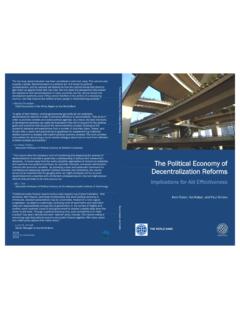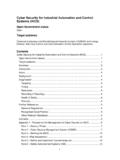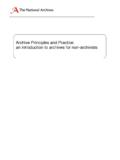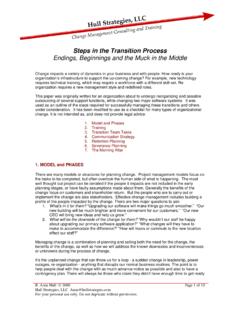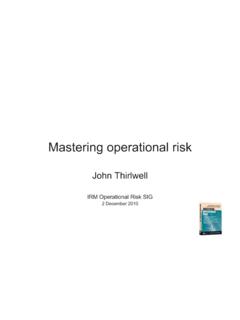Transcription of Program Brief (Draft Template) - World Bank
1 Program Brief Public Sector Governance Program Capacity Enhancement and Learning 1. Program Justification and Alignment Program Justification A well functioning public sector that delivers quality public services consistent with citizen preferences and fosters private market-led growth while managing fiscal resources prudently, is considered critical to the World Bank's mission of poverty alleviation and the achievement of millennium development goals. This Program aims to advance these objectives by disseminating conceptual guidance and lessons from practices and facilitating learning from each others'. experiences on ideas and practices that promote responsive (matching public services with citizens' preferences), responsible (efficiency and equity in service provision without undue fiscal and social risk) and accountable (to citizens for all actions) public governance in developing countries. Such knowledge creation and sharing is also expected to improve the development effectiveness of World Bank's assistance for public governance reforms.
2 Millennium Development Goals/Corporate Priorities of the World Bank Group Relevance to MDGs: All of the Public Sector Governance group's programs aim to maximize efficiency and accountability in the public sector, and in turn, the delivery of public services. This will help to address the MDGs related to education (Target 3) and health (child mortality: Target 5, maternal health: Target 6). Activities under the Fiscal Management, Intergovernmental Fiscal Relations and Local Finance will help address MDGs related to poverty reduction (Targets 1 and 2) by helping to promote development of lagging regions through targeting of less-developed and rural regions in countries targeted. Another MDG is the development of global partnerships for development the Program supports this goal by contributing to establish networks and partnerships among expert practitioners who may create communities of practice and foster south-south co-operations. The MDG to promote gender equality and women empowerment is mainstreamed into the Program by offering modules relating to the improvement of access to justice and merit goods for women.
3 Relation with the Corporate Priorities of the World Bank: The PSG group's activities actively promote four of the Bank's five Corporate Priorities. It is evident that all of the PSG group's activities support the Corporate priority #2, Public Sector Governance. The corporate priorities #4 &5 for improving education and health are supported as a result of the PSG group's focus on improving service delivery through reform of intergovernmental fiscal relations and local governance. Corporate Priority #3, Empowerment, Security and Social Inclusion is promoted 1. through the PSG group's emphasis on improving local governance (municipal governance) and accountability (media & information, public financial accountability). Link to WBI Strategy/WBI's Value Added The Governance Program uses the convening power of the Bank and its vast knowledge and complements with the knowledge gained from external sources to facilitate learning from each others' experiences on policies of critical importance to member countries.
4 In this context, to sustain the momentum of reform, it attempts to build consensus and coalitions for reform. Country Focus/ Operational Integration The PSG Program helps improve Bank's policy advice and contributes to better design and effective implementation of Bank operations through knowledge sharing and consensus building. The integration and compatibility of WBI capacity building programs with operational priorities is ensured through two major channels: i) coordination with RCET and country teams in the development of activities, and ii) the trust fund application process, which generally requires that complementarities of the proposed Program with the CAS or PRSP and lending be demonstrated. 2. Program Objectives Objectives Supporting CAS objectives on governance reforms;. Responding to client demands endorsed by the country teams for capacity enhancement, knowledge sharing and dissemination of better practices;. Facilitation of national and global dialogues on policy and institutional reforms to improve service delivery performance and accountability.
5 Contribution to consensus and coalition building for reform;. Strengthening demand for good governance and government accountability through learning programs for youth, media, judiciary and parliaments. The Program objectives are achieved by learning from each others' experiences and inspiring each other to do better and by documenting such knowledge on principles and practices. Such learning and consensus building for reforms are achieved through country focused local and national as well as regional and global dialogues. These dialogues are fostered by multi-year learning programs delivered through seminars, workshops, conferences, specialized courses, networking, action planning, technical assistance and support to World Bank Operations on principles and better practices in public sector governance. The Program also accommodates special on demand learning events to help developing country institutions address their core mandates through exchange of views with international experts or to discuss a high profile policy report.
6 All Program offerings are demand driven. For country focus programs, only requests from member countries that are duly endorsed by the World Bank country teams are entertained. The contents of individual programs and target audience are also determined in consultation with the World Bank country team and partner institutions of member countries. For focus countries, 2. contents and reading materials for the learning events are tailor made to suit specific circumstances. Reach The Program uses a blend method of delivery: for example, a course would consist of a series of videoconferences (GDLN), followed by a face-to-face event but the actual choice of the means of delivery rests with the preferences of the local partner institutions which are involved in the respective courses from the start. The local partners also decide on the outreach of a course . while some courses would aim to include many participants from various backgrounds, other courses would only aim to address specifically a very small group of participants.
7 The target audience and the mode of delivery is typically determined by the objectives of the learning Program . For example, to have a buy-in for a reform Program , a roundtable of senior policy makers may be convened. On the other hand to build local capacity to implement reforms, a larger workshop of relevant officials may be in order. The public sector governance Program reaches about 20,000 participants for about 60,000. participant training days from more than 100 countries annually through the use of GDLN, ICT. and face-to-face methods. In addition, local networks established in various regions extend the reach of WBI learning programs to wider audience. Innovation The Governance Program is managing the publication of Public Sector Governance and Accountability Series by the World Bank. Six books in this series have been published over the past two years. This series is serving as an outlet for wider dissemination of training modules. There are also additional publications on specific themes.
8 The Program has also initiated institutional capacity building pilots in Bangladesh and Turkey with significant achievements to date. 3. Program Implementation Components The WBI promotes learning from each others' experiences and inspiring each other to do better and by documenting such knowledge on principles and practices. Such learning and consensus building for reforms are achieved through country focused local and national as well as regional and global dialogues. The Program often accommodates special, on demand, learning events to help developing country institutions address their core mandates through exchange of views with international experts or to discuss a high profile policy report. The WBI is able, due to its reputation for excellence, to be able to bring clients together with international experts to consult on topics of interest to clients. The Bank is also more able than regional development banks to promote South-South learning cross-regionally.
9 These dialogues are fostered by multi-year learning programs delivered through seminars, workshops, conferences, specialized courses, networking, action planning, technical assistance and support to World Bank Operations on 3. principles and better practices in public sector governance. The Bank is in a unique position due to mature collaborative relationships with bilateral donors to mobilize and manage resources for these multi-year programs. The PSG groups programs are delivered through a variety of mechanisms, including: face-to- face, videoconferencing, digital radio, and online (web-based) courses. In fact, many of the programs are blended and use multiple forms of media to deliver programs. The Program is organized into two broad inter-related themes: (1) Public Sector Management. Public sector management is defined broadly to include protection of property rights and creation of an enabling environment for private sector development and competitive provision of public services.
10 This theme aims to ensure that government ensures efficient and equitable delivery of public services while minimizing fiscal and social risks. This theme covers principles and practices of fiscal management, including the intergovernmental fiscal relations, local government organization and finance, public financial management and public expenditure reform. In addition, a pilot Program on upgrading policy analysis at the Bangladesh Bank supports institutional reforms for sustainable capacity development. Major learning programs are as follows: a. Intergovernmental fiscal relations: division of fiscal powers , transfers and borrowing b. Local and Municipal Governance: organization and finance, budgeting, civil administration, service delivery performance, integrity c. Fiscal Management: budgeting and budgetary institutions, revenue administration d. Public Financial Management and Accountability: audits, accounts, evaluations, public expenditure management, legislative and citizen oversight e.




